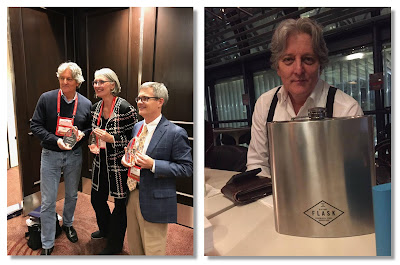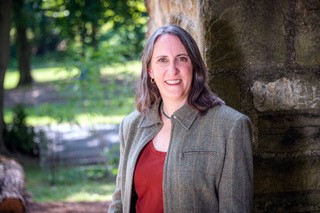Q: Life - Do you bring non crime writing friends or family with you to conventions? Pros and cons please.
A: The hardest part about going to a big event like a mystery convention are the days before, the flight in, the bus or train or cab from the airport, all those opportunities to worry if the kids on the playground will like me. Or will they discover that I don’t know anything about writing and am just another con artist? Will they ride up and run me out of town with torches and pitchforks?
Back in the Jurassic period when I was still drinking, these insecurities were why I drank before going to any large social event. As a sober guy I always prefer to go with Erika. She’s socially comfortable. People like her, hell I like her, I mean LIKE- like her - and regardless of the venue she and I are sure to have a good time.
In the early days I went alone to conventions. The pro of that was I was forced to meet people. Saint Louis or was it Cleveland Bouchercon was my second time at a crime writing convention, but my first time as a writer with a book out to hock. I had my regular worries leading up to the event. Then on the public transit train from the airport I met Chris and Katrina Niidas Holm. We started talking about nothing, just riffing, but I could tell they were my kind of people. At that same convention I met so many writers and reviewers and readers that remain friends to this day. What had felt scary turned out to be a family reunion of a family I didn’t know I had.
 |
Holm, Ziskin, Calkins, Stallings, and Berney awaiting sentencing. |
So in some ways going alone was good for me. Then Erika joined me and that was fantastic. It’s wonderful to look down from a panel and see her there. She fit in seamlessly with this criminal family, in fact I came to see many friends were happier to see her than me. Understandable. I remember once while checking into the hotel Catriona McPherson looked at me, then past me, then back to me, “Where’s Erika?” No hello Josh. No grand to see ya. Nope. Just “Where’s Erika?” That is the wonderful thing about our family, once you’re in, your in. Don’t show up for whatever reason, your absence will not go unremarked upon.
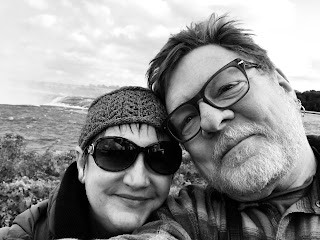 |
Erika and me at Niagara Falls |
Another wonderful thing about traveling with Erika is we make it a vacation. If it’s just me I feel the need to get there, do the convention and hurry home. With her we took the time to explore Toronto, and made a side trip to Niagara Falls. In New Orleans we saw the sights and ate our way through many great restaurants.
In recent years personal economics have made traveling to conventions hard for one and impossible for two. Left Coast Crime in Albuquerque last year was both wonderful and strange. I was alone again, and felt oddly cut adrift. Somehow the combination of the COVID years and traveling without Erika left me feeing socially uncomfortable. I did see many good friends, made some wonderful new ones as well.
My worst day at a crime convention beats the hell out of most days anywhere else.
Regardless of who I travel with, I am going to be surrounded by my family of choice once I arrive. I will go home invigorated about this craft of ours. And that my friends makes it all worthwhile.
I will be at Bouchercon San Diego. I hope to see you all there, even those of you I don’t know yet.






.JPG)
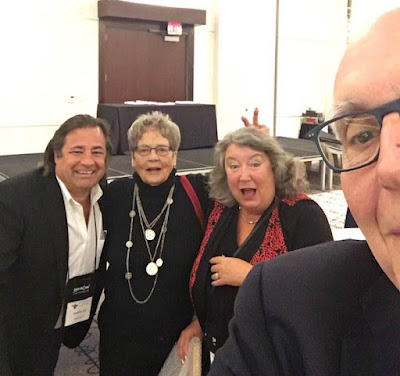
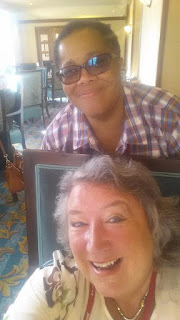

.png)


